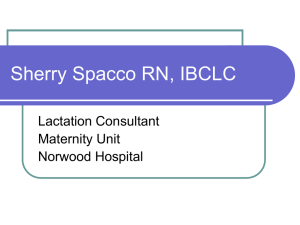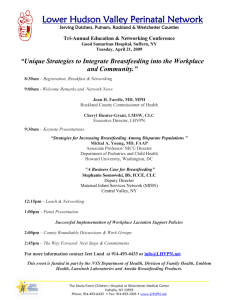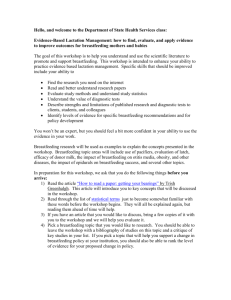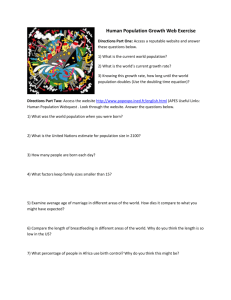Baby-Friendly - Massachusetts Breastfeeding Coalition
advertisement
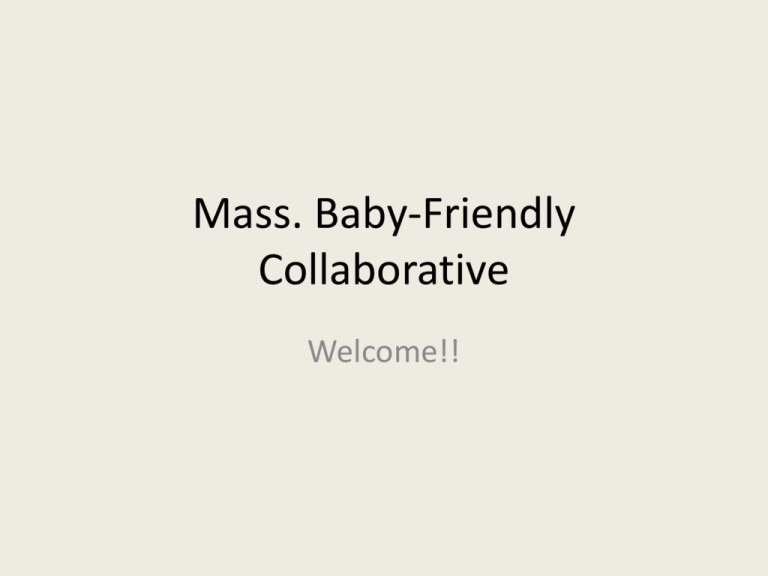
Mass. Baby-Friendly Collaborative Welcome!! Background • Informal Collaborative since 2008 • Mother-Baby Summit since 2009 • DPH Baby-Friendly Trainings Spring 2008 Our Faculty today • • • • • • Roger Edwards, ScD Mary Ellen Boisvert, RN, MSN, CLC, CCE Lucia Jenkins, RN, IBCLC Mary Foley, RN, IBCLC Judy Fayre, BS, RN, IBCLC Melissa Bartick, MD, MSc Today’s agenda • Part I: Information (didactic) • Part II: Hospital working groups • Part III: Based on your feedback on index card, breakout groups based on topics of most interest Future meetings Eastern Mass • Feb 28, 4:30-6:30 • April 4, 4:30-6:30 Western Mass • Holyoke Hospital • March 21, 4:30-6:30 • Axilliary Conf. Room • Both at Somerville Hospital Cafeteria Conf. Room Whole State Meeting: Thursday, May 2, approx 5:30-7:30 Log Cabin Conference Center, Holyoke MA Thank you to: UMMMC Mass. Breastfeeding Coalition Mass. DPH Our faculty and staff Website • www.massbreastfeeding.org/collaborative – Meetings times and places & directions – Resources Baby-Friendly Why it matters Melissa Bartick, MD, MSc Cambridge Health Alliance, Harvard Medical School Mass. Breastfeeding Coalition United States Breastfeeding Committee Patient-Centered Care 60% of women do not meet THEIR OWN breastfeeding goals. – CDC/FDA Infant Feeding Practices Survey II, 2008 Ten Evidence-based Steps 1) Written breastfeeding policy & communicate it to staff. 2) Train all health care staff to implement the policy. 3) Inform all pregnant women about benefits & management of breastfeeding. 4) Initiate breastfeeding within an hour of birth. 1) Show mothers how to breastfeed, and how to maintain lactation. 2) Give newborn infants no food or drink other than breast milk, unless medically indicated. 3) Practice rooming-in– allow moms and babies to be together 24 hours a day. 4) Encourage breastfeeding on demand. 5) Give no artificial teats or pacifiers to breastfeeding infants. 6) Foster the establishment of breastfeeding support groups and refer mothers to them on discharge from the hospital or clinic The 10 Steps: Do they work? . • CDC/FDA Infant Feeding Practices Study II • 1,907 women who intended to bf> 2 months • Measured: Breastfeeding termination at 6 weeks DiGirolamo A, Grummer-Strawn L, Fein S. Pediatrics 2008;122:S43–S49 Surveyed moms on 6 steps: • • • • • • Breastfeeding within 1 hour of birth Giving only breast milk Rooming in Breastfeeding on demand Not using pacifiers Fostering breastfeeding support groups Results . . . Compared with mothers who experienced all 6 steps . . . mothers who experienced no steps were 13 times more likely to stop breastfeeding by 6 weeks. DiGirolamo A, Grummer-Strawn L, Fein S. Pediatrics 2008;122:S43–S49 Most important steps: • Breastfeeding within the first hour of birth • No formula • No pacifiers DiGirolamo A, Grummer-Strawn S, Fein S. Pediatrics 2008;122:S43–S49 This confirms earlier work Most important predictors of weaning by 6 weeks in IFPS I were: • Delayed 1st feed beyond the first hour after birth • Giving formula without a medical reason From IFPS I, 1993-94 DiGirolamo A, Grummer-Strawn L, Fein S BIRTH 28:2 June 2001 PROBIT • Promotion of Breastfeeding Intervention Trial • Kramer et al randomized hospitals and associated clinics in Belarus • Some had usual care; others implemented BFHI type intervention PROBIT results • Baseline group/usual care • had 6.4% exclusive breastfeeding at 3 months • Intervention hospitals had 43% exclusive breastfeeding rates at 3 months EBF @ 3 mos Baby-Friendly Control hospitals EBF @ 3 mos Did it make a difference to population health? • • • • >17,000 infants enrolled Decreased infant gastroenteritis Decreased eczema Significant increase in school performance, IQ • Even though less than half of all infants were exclusively breastfeed x3 months Kramer et al, Arch Gen Psychiatry. 2008;65(5):578-584 Kramer et al, JAMA, January 24/31, 2001—Vol 285, No. 4 Baby-Friendly makes a difference • Hospital practices affect breastfeeding for months • First Hour is vitally important • Avoiding Supplements is Important • Avoiding pacifiers is important Why it matters • Patient-Centered Care • Population health –(babies and likely mothers) Size matters Other resources • www.massbreastfeeding.org/collaborative • Resource page • Link to videos on Vimeo.org MassBreastfeeding Coalition Password: Skin2Skin www.zipmilk.org
